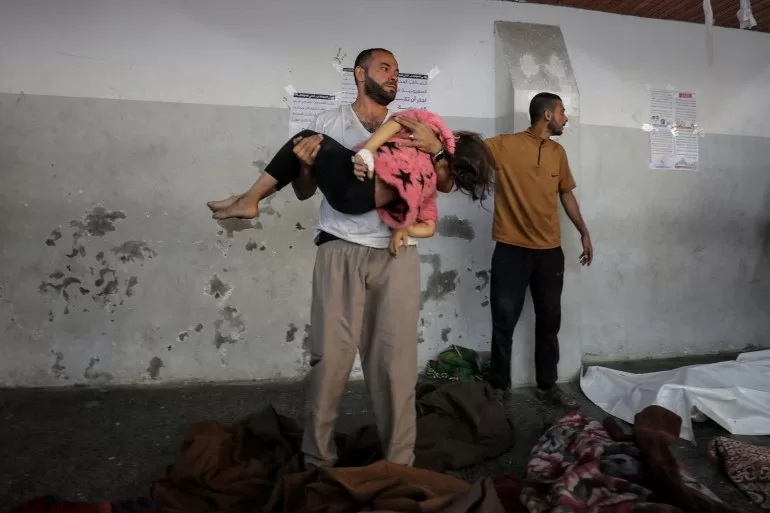Beirut, Lebanon – Israeli and Palestinian commentators and foreign officials are using the term “ethnic cleansing” to describe what Israel is doing in Gaza.
Israel has reportedly entirely blocked humanitarian aid from entering northern Gaza, escalated bombardments of refugee camps and hospitals, and called on all remaining inhabitants of the area to flee south.
Israel’s military spokesperson Itzik Cohen said nobody who leaves the north will be able to return.
United Nations agencies estimated that 69,000 to 100,000 people are still in northern Gaza.
The Israeli daily Haaretz has referred to Israel’s campaign as “ethnic cleansing”.
Josep Borrell, the top European Union diplomat, has tweeted: “Words like ‘ethnic cleansing’ are increasingly being used to describe what is taking place in northern Gaza.”
But what is ethnic cleansing? Does it apply to Israel’s actions in Gaza? And will calling it out lead to any justice?
Here’s all you need to know about the term and whether it adequately describes Israel’s policy in Gaza:
What is ethnic cleansing?
Ethnic cleansing refers to a stronger party removing an ethnic group from its land and sometimes replacing them with another demographic.
The goal often stated for this is to “ethnically homogenise” a region or territory.
The term does not exist in international humanitarian law but suggests that a number of crimes against humanity and war crimes are being committed at once, according to legal scholars.
One such crime against humanity is the forceful transfer of a population.

Is that the same as genocide?
“Ethnic cleansing is often used as a euphemism for genocide because the language of genocide is politically charged,” Heidi Matthews, assistant professor of law at York University in Toronto, told Al Jazeera.
Most attempts to “cleanse” a population entail more war crimes, including genocide, Matthews explained, adding that acknowledging it as such triggers a legal obligation on all states to “prevent and punish” genocide.
“Ethnic cleansing … sort of obliquely refers to various sorts of criminality without saying anything about whether the violence in question is being committed with an intent to destroy a protected group in whole or in part, which is the essential marker of genocide,” she said.
Does using ‘ethnic cleansing’ downplay what Israel is doing in Gaza?
“If there are states out there that want to use certain terms to prevent creating certain obligations to act, then I wouldn’t use ethnic cleansing,” Mark Kersten, legal scholar and professor at the University of Fraser Valley in Abbotsford, Canada, told Al Jazeera.
But describing the catastrophe in Gaza as “ethnic cleansing” may also trigger the same outrage and horror the killings in Bosnia and Herzegovina triggered, Kersten said.
“I think ethnic cleansing ups the ante … because I think it would be pretty daft to suggest the existence of ethnic cleansing does not raise directly the risk that genocide will also occur,” he added.
Gaza should first and foremost be understood as an Israeli genocide against Palestinians, Matthews argued.
The International Court of Justice ruled on January 26 that “Israel must, in accordance with its obligations under the Genocide Convention, in relation to Palestinians in Gaza, take all measures within its power to prevent the commission of all acts within the scope of Article II of this Convention.”
Article II of the Genocide Convention prohibits the killing of members of a group and inflicting conditions that could destroy a group in “whole or in part”.

Can there be ethnic cleansing but no genocide?
Ethnic cleansing can technically be carried out without committing genocide, Matthews said, stressing that that is clearly not the case in Gaza in her view.
“While it is theoretically possible that ethnic cleansing could be carried out under circumstances where the offenders did not intend to destroy the group but merely to move them off the land, that is not a plausible construction of the facts on the ground in Gaza,” she said.
Why are people only talking about ethnic cleansing in Gaza now?
Ethnic cleansing can be a useful way to communicate to the public that crimes against humanity are happening, but politicians and commentators should have invoked the term at the start of Israel’s devastating war on Gaza, legal scholar Alonso Gurmendi from the London School of Economics said.
“The benchmark to speak about ethnic cleansing happened months ago and I would say at the beginning of the war when we saw hundreds of thousands of people fleeing North Gaza. We effectively saw people being moved from one place to the other,” he told Al Jazeera.
“That to me was ethnic cleansing.”
Gurmendi pointed to the specific case of Israel ordering all Palestinians in northern Gaza to leave their homes and head to Khan Younis in the south.

Where did the term ethnic cleansing come from?
‘Ethnic cleansing’ entered common usage from 1992 to 1995 when journalists and politicians used it to describe Serbian attacks against Bosniaks, a predominantly Muslim demographic.
As the former Yugoslavia broke apart after the end of the Cold War, Serb militias attacked, raped and killed Bosniaks in a systematic campaign to drive them from territory they claimed for a “greater Serbia”.
“The idea [of greater Serbia] wasn’t that different from the idea of a greater Israel,” Gurmendi told Al Jazeera.
